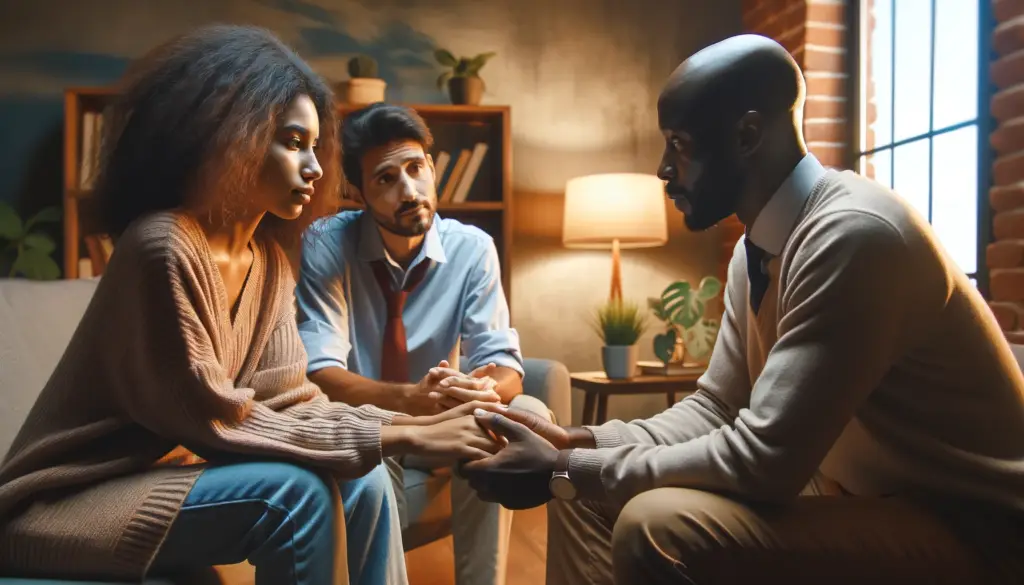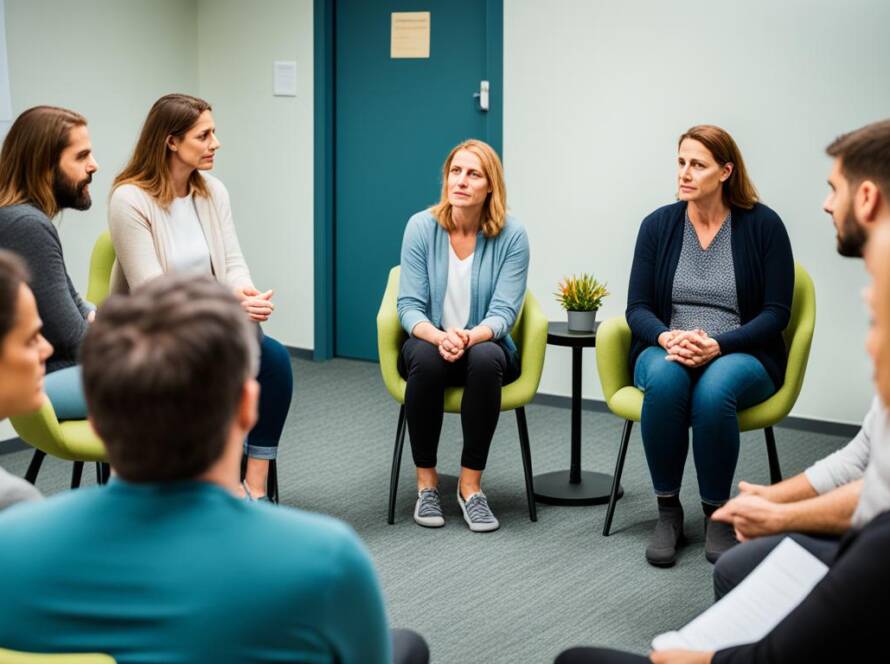As we journey through life, relationships play a crucial role in our well-being and happiness. Whether it’s a romantic relationship, marriage, or family dynamics, each relationship comes with its unique set of challenges and joys. At times, these relationships may encounter difficulties, leading to communication breakdown or conflicts that may affect our emotional and mental well-being. This is why relationship counseling is essential.
Enter relationship counseling, also known as couples therapy, marriage counseling, or family therapy. This form of counseling offers valuable tools and insights to improve communication, resolve conflicts, and build stronger and happier bonds. In this guide, we will explore the benefits of relationship counseling, how to find the right counselor, and techniques and strategies for building healthier and more robust relationships.
Key Takeaways:
- Relationship counseling can provide valuable tools and insights to improve communication, resolve conflicts, and build stronger relationships.
- Relationship counseling is also known as couples therapy, marriage counseling, or family therapy.
- The guide will explore the benefits of relationship counseling, how to find the right counselor, and techniques and strategies for building healthier relationships.
Understanding Relationship Counseling
If you are struggling in your relationship, seeking help from a mental health counselor can be a beneficial solution, either through relationship counseling or individual therapy. Relationship counseling is a form of mental health counseling aimed at improving relationships and resolving conflicts between couples or families. With the help of a trained therapist, individuals can address personal issues that are affecting their relationships and gain the necessary tools and insights to communicate effectively and develop a stronger bond with their partner.
Individual therapy can also be beneficial to those who are experiencing personal issues that are affecting their relationship. By addressing personal concerns, individuals can improve their mental health and well-being, leading to more fulfilling and healthy relationships.
Regardless of which approach you choose, seeking help from a mental health counselor is a positive step towards improving your relationships and overall quality of life.
The Benefits of Relationship Counseling
When it comes to relationships, effective communication and conflict resolution are essential to maintaining a healthy and happy bond with your loved ones. However, not everyone has the same natural-born communication skills or knows how to approach and handle conflicts. This is where relationship counseling can make the difference. As a therapist, I have seen firsthand the vast benefits that relationship counseling can bring to individuals, couples, or even families.
Through therapy, you can learn effective communication techniques that will help you express your thoughts and feelings clearly and empathetically. This, in turn, can help your loved ones gain a deeper understanding of your needs, perspectives, and motives.
Counseling also focuses on developing empathy, which is an essential quality in building strong relationships. Empathy helps us respect and understand our loved ones’ experiences, perspectives, and emotions. Through counseling, individuals can learn how to be more attentive and responsive to their partners, families, and friends, which will foster stronger bonds built on mutual respect and support.
Furthermore, one of the most significant advantages of relationship counseling is that it provides the right tools to navigate conflicts. Conflicts are a natural part of all relationships, but they can become problematic when we avoid them, or they escalate into bigger problems. Counseling can help us understand our triggers and find the right strategies to resolve conflicts that are satisfying and fair to both parties involved.
Ultimately, whether you want to enhance your communication skills, build better relationships, or simply strengthen existing bonds, relationship counseling can provide invaluable support and guidance. The benefits of counseling go beyond resolving current issues and can help foster long-term personal and relational growth.
When to Consider Relationship Counseling
Relationships can often encounter difficulties, but when these problems become ongoing and start to impact your relationship negatively, it might be time to consider seeking professional help. If you are experiencing frequent arguments, feeling disconnected from your partner, or struggling with trust issues, seeking love and relationship advice from a trained therapist can be highly beneficial.
Remember, seeking counseling support does not indicate weakness; on the contrary, it reflects a strong desire to resolve issues and maintain a healthy relationship. A qualified therapist can help you gain clarity on your feelings, identify negative patterns of behavior, and develop new skills for communication and conflict resolution.
The decision to seek relationship counseling can be challenging, but it’s important to prioritize your relationship’s well-being. In the next section, we’ll discuss tips for finding the right counselor to ensure a successful therapy experience.
Finding the Right Relationship Counselor
When it comes to relationship counseling, finding the right counselor is essential for a successful therapy experience. It’s important to select someone who is qualified, experienced, and specializes in relationship counseling. Here are some tips on how to find the right counselor:
- Search for counselors who have experience in relationship counseling and mental health counseling.
- Ensure the counselor you choose is licensed and certified in your state.
- Read online reviews and testimonials from previous clients to gauge their success rate.
- Ask for recommendations from trusted friends, family, or healthcare professionals.
- When comparing counselors, consider factors such as cost, availability, and accessibility.
- Schedule initial consultations with potential counselors to determine if you feel comfortable working with them and if their counseling style aligns with your needs.
Remember, finding the right relationship counselor can take time and effort, but it’s worth it to ensure a successful therapy experience. See the table below for a comparison of different factors to consider when selecting a relationship counselor.

| Factor | What to Look For | |
|---|---|---|
| 1 | Experience | Counselor specializes in relationship counseling and mental health counseling. |
| 2 | Licensing and Certification | Counselor is licensed and certified in your state. |
| 3 | Reviews and Testimonials | Positive reviews and testimonials from previous clients. |
| 4 | Recommendations | Recommended by trusted friends, family, or healthcare professionals. |
| 5 | Cost and Availability | Consider factors such as cost, availability, and accessibility. |
| 6 | Initial Consultation | Meet with potential counselors to determine if you feel comfortable working with them and if their counseling style aligns with your needs. |
By choosing the right relationship counselor, you can begin your therapy journey with confidence and trust in your counselor’s experience and expertise.
What to Expect in Relationship Counseling Sessions
In order to fully understand what to expect in relationship counseling sessions, it’s important to know that each session will be tailored to meet the specific needs of the individuals involved. In couples therapy, for instance, the sessions may focus on communication techniques, conflict resolution, and establishing a deeper emotional connection.
During counseling sessions, there are various types of therapy techniques that may be used to help individuals and couples address their relationship challenges. For example, talk therapy is a common technique used to encourage open and honest communication about issues affecting the relationship. Role-playing exercises may be used to help couples practice new communication techniques in a safe, supportive environment. And experiential exercises may help couples better understand each other’s perspectives and emotions.
In addition to couples therapy, family therapy can also be a valuable tool for addressing relationship issues within the broader family context. By including family members in the therapy process, individuals and couples can gain a deeper understanding of the dynamics and patterns that affect their relationships. Family therapy can also encourage better communication and problem-solving techniques for the family as a whole.
Ultimately, the goal of relationship counseling sessions is to provide a safe and supportive environment for individuals and couples to work through their relationship challenges. By working with a trained therapist and utilizing effective communication techniques and therapy methods, individuals and couples can strengthen their relationships and achieve a deeper sense of love and connection.
Techniques and Strategies for Building Stronger Relationships
As I mentioned earlier, building healthier and stronger relationships requires consistent effort and practice. To cultivate a deeper connection and foster mutual respect, consider utilizing these techniques:
- Active listening: Instead of simply waiting for your turn to speak, make a conscious effort to actively listen to your partner or family member. This means making eye contact, acknowledging their feelings, and asking open-ended questions to encourage further discussion.
- Empathy: Try to put yourself in your loved one’s shoes and see things from their perspective. This can help build compassion and understanding, even when you disagree on certain issues.
- Clear communication: Be honest, direct, and respectful when communicating your needs and feelings. Avoid passive-aggressive behavior or making assumptions about the other person’s intentions.
- Conflict resolution: When disagreements arise, it’s important to find a constructive way to work through them. This might involve compromising, finding common ground, or seeking the help of a professional mediator.
Remember, building a strong relationship is a journey that requires patience, dedication, and ongoing effort. By consistently implementing these techniques and strategies, you can foster a deeper connection with your loved ones and build a happier, more fulfilling life together.
Maintaining Relationship Wellness
It’s essential to ensure that the progress made towards having a healthy relationship does not diminish with time. The following are important elements of relationship maintenance:
- Trust-building: Trust is one of the fundamental pillars of a relationship. Building and sustaining trust requires effort and consistency from both parties. By keeping your promises, being honest, and communicating openly, you can strengthen the trust between you and your partner.
- Revisiting goals and expectations: Over time, goals and expectations can shift, and it’s essential to realign them to keep the relationship on track. By discussing and updating your goals and expectations, you can ensure that both you and your partner are working towards a shared vision.
- Preventive measures: Seeking marriage counseling or family therapy as a preventive measure can help identify potential issues before they become significant problems. Regular counseling sessions can provide a space for healthy communication and conflict resolution, enabling you to address any challenges in a timely manner.
By implementing these elements, you can ensure that your relationship remains strong and healthy over time.
Conclusion
As I end this guide on navigating relationships, I hope that you have gained valuable insights on how relationship counseling can help you improve your bonds with your partner or family. Remember that seeking therapy is not a sign of weakness, but rather a courageous step towards growth and self-improvement.
Now that you understand the benefits of counseling, take the time to find a qualified therapist who can guide you along your journey. Consider the tips I provided on evaluating potential counselors, and don’t be afraid to ask questions during your initial consultations.
As you work towards building stronger relationships, remember that it takes consistent effort and practice. Implement the techniques and strategies I outlined in this guide, and don’t hesitate to seek marriage counseling or family therapy as preventive measures to maintain relationship wellness.
I wish you all the best in your journey towards healthier and happier relationships!
FAQ
What is relationship counseling?
Relationship counseling, also known as couples therapy or marriage counseling, is a form of mental health counseling focused on improving relationships. It involves working with a trained therapist to address issues and challenges that may be impacting the relationship. Individual therapy can also be beneficial for addressing personal issues that can affect relationships.
What are the benefits of relationship counseling?
Relationship counseling offers numerous benefits, including improved communication skills and conflict resolution. Through therapy, individuals and couples can learn effective communication techniques, develop empathy, and gain a deeper understanding of each other’s needs and perspectives. Counseling also provides tools to navigate conflicts and find resolutions that are fair and satisfying to both parties.
When should I consider relationship counseling?
It’s important to consider relationship counseling when you notice ongoing difficulties or patterns of behavior that negatively impact the relationship. Whether it’s frequent arguments, a lack of trust, or feeling disconnected from your partner, seeking professional help can provide support and guidance to overcome these challenges.
How do I find the right relationship counselor?
Choosing the right relationship counselor is crucial for a successful counseling experience. It’s important to look for a qualified and experienced counselor who specializes in relationship counseling. You can evaluate potential counselors, ask questions during initial consultations, and consider affordability and accessibility factors.
What can I expect in relationship counseling sessions?
Relationship counseling sessions can vary depending on the specific needs of the individuals or the couple. Typically, therapy techniques such as talk therapy, role-playing, and experiential exercises are used. Family therapy can also play a role in addressing relationship issues within a broader family context.
What techniques and strategies can help build stronger relationships?
Building healthier and stronger relationships requires consistent effort and practice. Effective techniques include improving communication skills, resolving conflicts through active listening and empathy, and fostering intimacy and connection through mutual respect. Love and relationship advice can provide guidance in building and maintaining healthy relationships.
How can I maintain relationship wellness?
Relationship wellness goes beyond addressing current challenges. It’s important to maintain healthy relationships by building trust, revisiting goals and expectations, and seeking marriage counseling or family therapy as preventive measures. Regular check-ins and open communication can help sustain a foundation of love, respect, and happiness.




